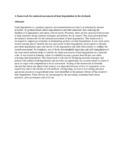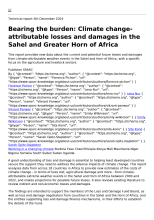/ library resources
Showing items 1 through 9 of 9.Land degradation is a gradual, negative environmental process that is accelerated by human activities. Its gradual nature allows degradation to
proceed unnoticed, thus reducing the likelihood of appropriate and timely control action. Presently, there are few practical frameworks to help
The United Nations General Assembly declared 2021 to 2030 as the decade of ‘ecosystem restoration’, signalling a global consensus on the urgency to restore degraded lands.
The recent FAO in-depth study on agricultural and food problems in Africa concluded that even the present inadequate food supply situation is unsustainable.
Land degradation is a gradual, negative environmental process that is accelerated by human activities. Its gradual nature allows degradation to proceed unnoticed, thus reducing the likelihood of appropriate and timely control action.
As World leaders forged two new big deals in late 2015 – the Sustainable Development Goals (SDGs) and the Climate Change Agreements – over 200 experts and technical officers working in fields related to land and water management, participated in the 3rd Land and Water Days held at the Food and Ag
The world’s mangroves 1980–2005 is a thematic study undertaken within the framework of the Global Forest Resources Assessment 2005.
FAO and the Global Mechanism of the UNCCD have joined efforts to prepare this discussion paper on sustainable financing for FLR.
This report provides new data about the current and potential future losses and damages from climate-attributable weather events in the Sahel and Horn of Africa, with a specific focus on the agriculture and livestock sectors.
Land Library Search
Through our robust search engine, you can search for any item of the over 73,000 highly curated resources in the Land Library.
If you would like to find an overview of what is possible, feel free to peruse the Search Guide.






